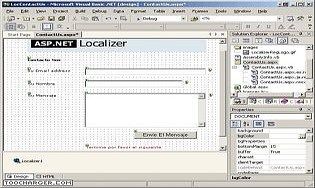
This would be potentially problematic if you’re quite concerned about data security.
Android localizer how to#
There is more than one plugin out there that can be used for localization purpose, in this case, I chose the one called “AndroidLocalize” and I’ll show you how to work with it in the video below.Īs mentioned at the end of the video, this plugin is more like a black box by using which you cannot tell which MT engine it is using. When we first downloaded the source file of this App, for localization purpose, we deleted most reference string files and de-localized it to make it more “raw”.
Android localizer code#
The code is very clean and well organized and has been partially localized. It is a very light and useful app, allowing you to add todos easily and quickly.

Android localizer android#
To illustrate how it works, I will use the Android App called Minimal Todo. Moreover, most plugins support a variety of locales which can meet your needs most of the time. The other cool aspect is that, with MT implemented with these plugins, users can sometimes customize the MT engine leveraged by the plugin, making the localization more relevant to a specific locale. With a plugin installed, we can automate the process of translation and generating resource files within just a few clicks. The best part about localization with a plugin is that localizers do not need to manually add the string files and send them out for translation. The other way is localizing with plugins, which will be explained in detail in this blog post.īefore we start our localization journey, I’d like to mention why localizing with plugins would be cool and in which way can it outperform the first localization method. First, add new locales to externalized strings under the res > values folder and get these strings.xml files with locales transferred to translators or editors.

Basically, there are two simple ways to do this. Once we have finished the externalization, our App is ready for localization. More detailed information on how to do pre-localization engineering can be found in the Android Development Documentations. However, Android developers with internationalization mindset would not build the App this way but will put all the strings into the resource folder for future localization. What we’ve done so far can be redeemed as the internationalization engineering part if our App is developed with all the strings hard coded. Next, we could create alternative strings.xml files, each stored in a locale-specific resource directory, based on our target languages. Basically, we need to externalize all the hard-coded UI strings into an xml file and put it under the “res/values” folder of our project. The internationalization and localization of Android Apps is easy when working with Android Studio.īefore we get our App ready for localization, the first thing to do is internationalization. If you use String Component Localizers, Unity also selects the table and key that most closely matches the text.Launching your Android App with support for different languages is essential for Apps going global. When you select this, Unity adds a new Component Localizer and hook its events up to the target component.

These components have a Localize option in their context menus. Some Unity components allow you to add an automatic Component Localizer to them. Public class LocalizeSpriteBehaviour : LocalizedAssetEvent This example shows how support could be added for the Sprite asset. The Localization System currently features some implemented versions of LocalizedAssetBehaviour for Texture(LocalizeTextureEvent) and Audio Clip(LocalizeAudioClipEvent). LocalizedAssetEventis an abstract class that should be inherited from in order to set the Asset type. LocalizeAssetEvent can localize a Unity asset, such as a Texture or Audio clip. You can also use the LocalizeStringEvent editor to edit tables and Localized strings, and preview them after formatting. In the Inspector, Format Arguments must be UnityEngine.Objects however, it is possible to pass any type through as an argument via script. The LocalizeStringEvent Component Localizer localizes strings and provides additional arguments when using Smart Strings or String.Format. Component Localizers allow for localizing without the need to write any scripts. Component Localizers are MonoBehaviours which you can connect to other components/scripts through UnityEvents.


 0 kommentar(er)
0 kommentar(er)
